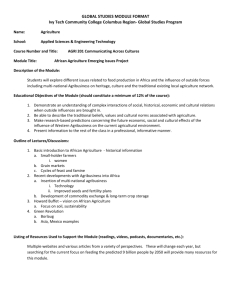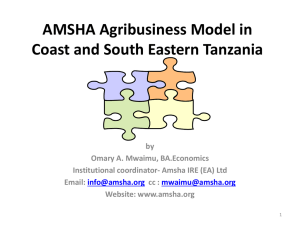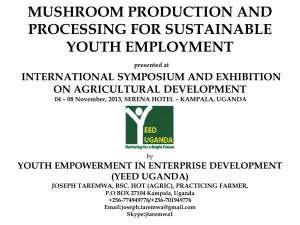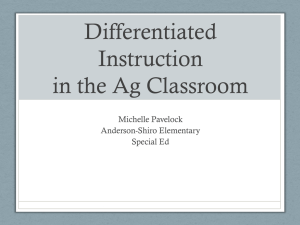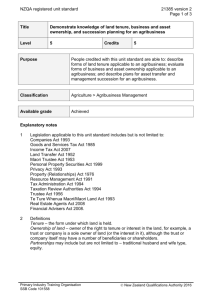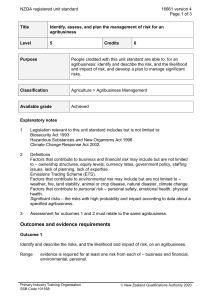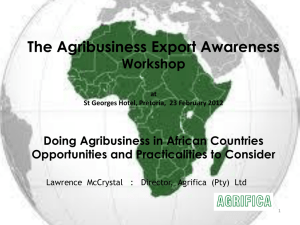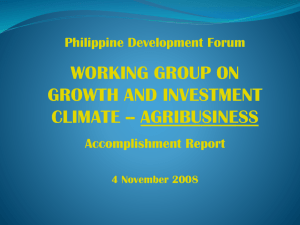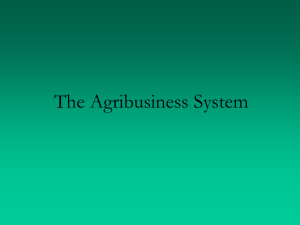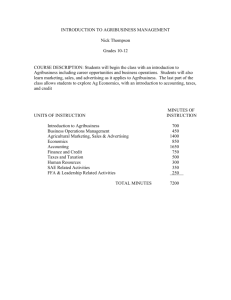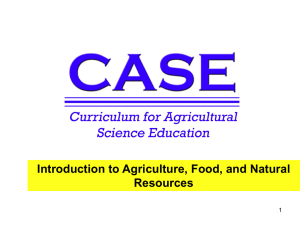Prof Johan van Rooyen - BizConnect
advertisement
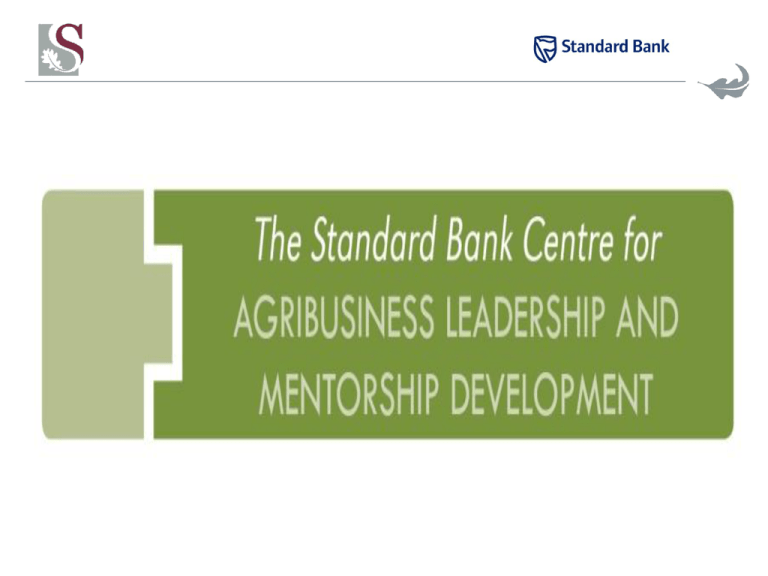
Standard Bank Centre for AgriBusiness Development and Leadership TALENT DEVELOPMENT: A MAJOR DRIVER IN GROWTH AND DEVELOPMENT IN AGRIBUSINESS Johan van Rooyen TALENT - THE TOPIC OF THE DAY “PEOPLE ARE TRAINED TODAY FOR CAREERS THAT DOES NOT EXIST YET” (JR) • SA ACADAMY OF SCIENCE STUDY • TEAM AFRICA PROJECT • PMA ACADEMY/ CAREERS FAIRS HOT TOPIC OF THE DAY: TALENT TO DRIVE THE CHALLENGE TO “FEED THE WORLD” THE TOPIC OF THE DAY THE TOPIC OF THE DAY “PEOPLE ARE TRAINED TODAY FOR CAREERS THAT DOES NOT EXIST YET” (JR) • SA ACADAMY OF SCIENCE STUDY • TEAM AFRICA PROJECT • PMA ACADEMY/ CAREERS FAIRS HOT TOPIC OF THE DAY: TALENT TO DRIVE THE CHALLENGE TO “FEED THE WORLD” 1. THE STANDARD BANK CENTRE FOR AGRIBUSINESS DEVELOPMENT AND LEADERSHIP at SU Agricultural Transformation: * A major challenge for South Africa and Africa : • • • • • Land reform Commercialization Sustainable rural development Jobs Food security * Agribusiness – the key (WB, AU, OECD, FAO, NDP…) ACTIVATING THE AGRIBUSINESS LINK : Stellenbosch University, the Standard Bank of South Africa: • • “meeting of minds” lead to the establishment of the “Standard Bank Centre for Agribusiness Development & Leadership” in 2010; jointly funded by The Standard Bank and Stellenbosch University. Supported by AgBiz, PwC • Flag ship project of the US Hope Project • The Standard Bank funding was extended in 2013 until 2016. • THANK YOU STANDARD BANK!!! THANK YOU STANDARD BANK! IN PRACTICAL TERMS - FROM THIS TO THIS : The Standard Bank Centre for Agribusiness Development & Leadership * a “FLAGSHIP INITIATIVE” of STELLENBOSCH UNIVERSITY: The Centre is positioned as a high profile initiative, manifesting the University’s intention to be a trustworthy and innovative knowledge partner in today’s agricultural development future and transformation challenges. • Mission of the Centre: “Foster sustainable agribusiness transformation through the generation and transfer of knowledge and the development of capacity directed at leadership and mentorship” CORE FOCUS AND CLIENTS: •Development agencies to manage, mentor and guide new farmers and agbusinesses to be: - settled productively on farming land under the land reform programme; and to be - successfully integrated in to the agri-value chain * Agribusiness executives responsible for development initiatives and agri-mentors/coaches * Agri-Leaders - current and future- to influence matters related to agri-transformation and development Strategic partners - Standard Bank of SA & Stellenbosch Universityfunding/ strategic direction - PricewaterhouseCoopers – training support - The Agribusiness Chamber of South Africa ( 70+ of the major agribusinesses operating in SA) – case studies, advice - Government agencies – contracts, advice - Agri-commodity groupings- grain, fruit, dairy, wine,… contracts, advice, partnerships - International agencies and universities. Centre Programmes THE ACADEMIC PROGRAMME: • Post graduate training and research – PhD & Master( M. AGRIC.) - 33 bursaries since 2010 • Course work and case studies in: Ag Economics; Ag Business; Agricultural development project planning, appraisal and evaluation; Agricultural and rural policy analysis. • Scientific articles, books & chapters in books, reports, papers, etc – already a well established entity - local & global. CASE STUDY EXPOSURE! OUTREACH PROGRAMMES 1. MENTORSHIP/LEADERSHIP DEVELOPMENT: This programme, implemented in collaboration with PricewaterhouseCoopers, focuses on: * accredited short course training in executive leadership & mentorship development, business counseling & coaching; * advisory support services for the planning and design of mentorship and coaching, support with the selection of candidates, and the monitoring and evaluation of mentorship programmes; * workshops, laboratories, case studies, round tables, conferences and seminars to promote an interactive learning environment; * the maintenance of a data base. Agri-Mentorship Short Course Programme Strategic Leadership, Business,Ethics Mentorship/ Coaching Change Management Conflict Management,Negotiation,Teamwork Problem-Solving Enterprise Development & Business Planning Governance Relevant Agriculture legislation Project Management Finance for Non Financial Managers Transformation issues and policies TRAINING PROGRAMME • Modules: • • • • • • • • 1.Strategic Management & Leadership: Apply leadership concepts in a work context; Analyse leadership and related theories in a work context Assist with the organisation and management of extension and development 2.Teams & Teamwork: Build teams to achieve goals and objectives; Lead and manage teams; Apply the theories, principles techniques and tools of group dynamics to extension in a simple group setting 3.Mentorship & Coaching: Provide coaching to personnel within a Contact Centre; Apply ‘best practice’, mentoring, training and accountability in extension; 4.Change Management: Apply the principles of Change Management in the workplace; Facilitate behaviour change and innovation in extension 5.Project Management: Explain fundamentals of project management1; Design, implement, integrate and manage extension/development projects and programmes • • • • • • • • • • • TRAINING PROGRAMME • • • • • • • • • • • • • • • • • • • 6.Problem Solving: Apply problem solving strategies; Demonstrate an ability to apply the principles of problem identification, analysis and decision-making within a work context; 7.Conflict Management & Negotiation Skills: Design and implement plans to deal with conflict situations ; 8.Time & Stress Management: Apply efficient time management to the work of a department/division/section; Demonstrate stress management techniques as a self-help tool Prioritise time and work for self and team 9.Finance for Non-Financial Managers: Recognise, measure, classify and record financial and non-financial data; 10.Agribusiness governance: Apply the principles of corporate governance and ethics ; Analyse compliance to legal requirements and recommend corrective actions; Indentify and interpret related legislation and its impact on the team, department or division and ensure compliance; 11.Enterprise development and Business Planning 2. LEADERSHIP LABORATORY • IMBIZO programme invite agri-leaders in own right to “think tank” on HOT TOPICS (14 to date) in AGRICULTURE: - LAND REFORM ISSUES (3X); WORK CREATION (2X); UNITY IN SA AGRICULTURE (3X) - AUFSA; WATER & AGRICULTURE; 4 YOUTH LEADERSHIP LABS – PROMINENT FACILITATORS; THE FUTURE OF BLACK COMMERCIAL FARMERS. SIGNIFICANT INPUTS IN TO NATIONAL DEVELOPMENT COUNCIL AND NDP – CHAPTER 6 IMBIZO’S to follow: Land Reform Pilot Project, Food Security, Talent & Training, Rural Development, the Africa Agriculture Connection, Competitiveness, Commercial Farming, Support to New/Emerging Farmers Commercial agric meeting the Governing party OUTREACH PROGRAMMES 3. NEW:BUSINESS DEVELOPMENT SUPPORT SHORT COURSE + INCUBATOR SUPPORT: US, Standard Bank and PwC 4. African Leadership Programme • • African Fellowship Trust, Royal Agricultural University ,UK and SA Agri-business partnerships 21 Master level Africans in SA for AGBUSINESS PLACEMENTS and over three years. – future networks ROYAL AGRIC UNIV UK PARTNERSHIP ALP - AGBIZ EXPOSURE 2. APPROACH TO TALENT DEVELOPMENT: CREATING A LEARNING ENVIRONMENT AGRIMASS STUDY( ABC/SANTAM/SB): TOP 10 DRIVERS OF AGBUSINESS TOP 5 SHAPERs OF FUTURE AGBUSINESS SYSTEMS SHAPING THE AGBUSINESS ENVIRONMENT FUTURE AGBUSINESS STRATEGIES FUTURE AGBUSINESS STRATEGIES: FUTURE TALENT NEEDS: THE AGRIMASS STUDY: AGRIMASS – 2000 vs. 2012 Top overall ranking of aptitude and skills sets in two AGRIMASS surveys (2000 & 2012) are exactly the same: 1. Personal management qualities 2. Communication Skills 3. Business strategy and Economic Skills 4. Quantitative, and Info Management 5. Technical Skills 6. Employment, Work, and General Experience TOP INTERPERSONAL SKILLS FRESH PRODUCE MARKET AGENTS (PMA ) ACADEMY STUDY: Objectives: • Establishing the available pre- and post-graduate courses at universities and colleges relating to horticulture and post-harvest technology; • Determine the number of jobs to be filled and the skills and training needed, across the fresh produce supply chain; • Document the number of internship and bursaries currently provided across the fresh produce supply chain. Q 1.CRITICAL AND DIFFICULT SKILLS: Q 2: HOW TO IMPROVE SKILLS BASE: Q 3: COMBINED SKILLS SETS REQUIRED: Q 4: VALUE OF OPERATIONAL EXPOSURE? Q 5: USE OF FINANCIAL SUPPORT: Q 6: USE OF INTERNSHIPS? Q 7: INDUSTRIAL PLACEMENTS? 3. TOWARDS THE FUTURE: • Focus on succession & soft skills requirements: Interpersonal and communication skills development – HOW? Short Courses; team work. • Note future change drivers: Long term relationships, - new risk management. Understand consumer behavior. Information sharing with supply chain/networks. Multinational/ global food wholesalers/retailers. Science and Technology. • Food Business System Shapers Uncertainty and volatility. Increasing urbanization. Trade policy. Changing technology. Rising income in emerging/new markets. 3. TOWARDS THE FUTURE: • Qualifications: Focus on Science Based first/second degrees, then combined skill sets • Practical experience Discussions with industry and universities Challenges and constraints • Internships Practical experience Accommodation Administration • Combined skill sets Second degrees & discussions with tertiary education institutions about changes to existing programs – AGBIZ training 3. TOWARDS THE FUTURE: Promote active industry involvement with academic “SILOS”: • Make them offers they can not refuse! • Directed bursaries/scholarships; • Internships/industry placements; • Science based – MBA options; • Young professional programmes THANK YOU
